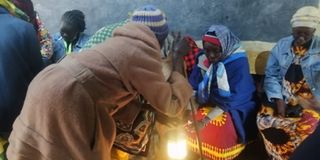Kiems kits: Elderly women forced to warm their hands over gas lamps

The electoral agency’s decision to use the Kiems electronic gadgets to identify voters has put senior citizens in some parts of the North Rift region in uncomfortable situations.
Some casual workers were also turned away after the kits failed to read their fingerprints.
The elderly who turned up in large numbers at polling stations in Elgeyo Marakwet, Uasin Gishu and West Pokot counties to perform their civic duty had to scrub their hands on rocks, rub their palms together, warm them up over gas lamps or even apply a coat of oil jelly in a bid to soften their hands.
Elderly women were the most affected, with some having to place their fingers repeatedly on the kits as poll workers attempted to read their fingerprints.

At the Turesia station in Elgeyo Marakwet, Nation.Africa encountered more than 10 elderly women warming up their hands over a gas lamp after the Kiems kits failed to recognise their fingerprints.
“Some of them have tried over 10 times, to no avail. We have devised all means to ensure they vote and that’s why you are seeing them warming up their hands because they should exercise their democratic rights,” said presiding officer Hillary Kosgei.
Nature of work and biting cold
He attributed the challenge to old age and the nature of work the elderly women do at their homes, as well as the current biting cold in the area.
“When their hands are warm, the fingerprints become visible and the kits recognise them,” he said.
Ms Kabon Kapkong, 80, lamented that her hands were almost burning after she warmed them for several minutes.
“At last, I voted despite almost burning my fingers. In the past, we only presented our national identity cards without pressing on the device, which is uncomfortable for us,” Ms Kapkong said after casting her vote.
Ms Tapsingoei Kibet, 90, tried a record 13 times before the kit recognised her fingerprints.
“Maybe I am too old and my little blood is making my fingers numb and frail to the point of losing my identity,” she told poll officials, who desperately tried to find a solution and even tried to scan her face, to no avail.
Less hitches for elderly men
But the fingers of most elderly men did not pose a problem for the Kiems kits.
For instance, the identity of Mzee Kipkirui Rotich, 97, was verified with a single press on the kit.
“I am happy to have voted and I will consider myself lucky to have voted for Kenya’s five presidents since independence,” he said.

It was the same case in West Pokot County, where Beatrice Nasiebanda, 72, and Chepchemuse Munango, 82, said they were disillusioned about the process.
"I have been told to wait and I hope I will get a chance to cast my vote," Ms Nasiebanda said.
Ms Munango said: “I must vote today. I will be here until evening.”
Nation.Africa established that the manual register was being used alongside the Kiems kits in identifying voters.
But Kapenguria constituency returning officer Enock Otara said most of the kits performed well, with a few affected by power supply issues.
"We have talked to Kenya Power and they have promised to rectify [the problem]," he said.
Clean fingers
Other polling stations where older voters had fingerprints challenges included Kesses and Lenguse. Voters had to thoroughly clean their fingers to be identified.
Some casual workers in Kesses constituency also encountered the same challenge as their fingerprints could not be captured. They were turned away and could not vote.
By Fred Kibor, Barnabas Bii and Oscar Kakai






